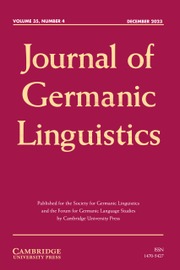Article contents
What gives with es gibt? Typological and comparative perspectives on existentials in German, Germanic, and Indo-European
Published online by Cambridge University Press: 05 December 2008
Extract
To the memory of Edgar Polomé, who inspired with his keen interest in Germanic and Indo-European
Modern German existentials with impersonal es gibt are attested only rather late in the German tradition (from late Middle High German, in the fourteenth century), have few compelling cognate constructions (if any) elsewhere in Germanic, and thus are usually taken to be an extension of other senses (e.g., ‘give, produce, yield’) of the verb geben. It is noted here, though, that parallels with existentials based on verbs meaning ‘have, take’ cognate to geben can be found elsewhere in Indo-European, in particular in Old Irish and Latin. When viewed against the backdrop of there being several verbs in Indo-European meaning both ‘give’and ‘take’, these facts suggest an interpretation wherein the existential sense of geben is the archaism, and the meaning ‘give’is a Germanic innovation.*
- Type
- Articles
- Information
- Copyright
- Copyright © Society for Germanic Linguistics 2000
References
REFERENCES
- 3
- Cited by


